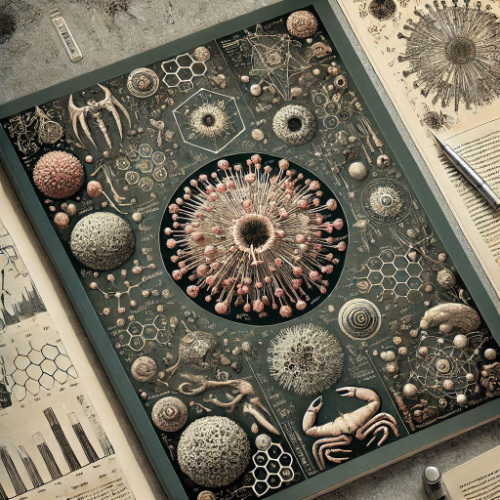What Is Immunology?
Immunology is more than just a scientific discipline — it is the story of the human body's constant battle for survival. Every second, your body faces invisible threats: viruses, bacteria, toxins, and even rogue cells from within. Yet, without conscious effort, a sophisticated defense system is working tirelessly to protect you. This fascinating network, known as the immune system, is one of the most complex and finely tuned biological mechanisms in existence.
At its core, immunology explores how the body recognizes, responds to, and remembers these threats, ensuring long-term protection against diseases. This field is not only foundational for understanding health but has become central to modern medicine — from vaccination programs that have saved millions of lives to cancer immunotherapies transforming treatment paradigms.
Throughout human history, the immune system has stood as the frontline defense in the battle against infectious diseases. Before the advent of modern medicine, epidemics such as smallpox, tuberculosis, and the Spanish flu ravaged populations. The discovery of immunological principles, including Edward Jenner’s smallpox vaccine in 1796, marked the beginning of humanity's ability to control and prevent deadly outbreaks.
However, immunology goes far beyond fighting infections. It helps explain phenomena like:
- Why some people recover faster from illness than others
- Why autoimmune diseases like lupus occur
- How allergic reactions are triggered
- The science behind organ transplant rejection and compatibility
Definition and Scope
Immunology is the branch of biomedical science that focuses on the study of the immune system, which protects the body from pathogens, such as bacteria, viruses, fungi, and parasites. It explores how the body defends itself against harmful invaders while maintaining tolerance to self-tissues and beneficial microbes.
The field of immunology extends to various applications, including:
- Infectious disease research
- Vaccine development
- Autoimmune disease management
- Cancer immunotherapy
- Organ transplantation and rejection prevention
The immune system operates through a complex network of cells, tissues, and signaling molecules working together to detect and neutralize threats while distinguishing self from non-self.
Innate Immunity: The First Line of Defense
The innate immune system provides a non-specific, immediate response to pathogens. It is present at birth and relies on barriers and general defense mechanisms, including:
- Physical barriers: Skin, mucous membranes
- Chemical barriers: Enzymes in saliva, stomach acid
- Cellular defenses: Macrophages, neutrophils, natural killer (NK) cells
These components act quickly but lack the ability to remember pathogens for future protection.
Adaptive Immunity: A Targeted Response
The adaptive immune system develops over time and provides a specific response to pathogens. Key features include:

- Antigen specificity: Identifies and targets specific pathogens
- Immune memory: Remembers previous infections for faster future responses
- Delayed response: Requires initial pathogen recognition before activation
Key Cells and Molecules in Immunology
The immune system involves a variety of cells and molecules:
- B cells: Produce antibodies for pathogen neutralization
- T cells: Directly attack infected cells and regulate immunity
- Macrophages: Engulf pathogens and present antigens
- Dendritic cells: Present antigens to T cells
- Cytokines: Signaling molecules that mediate inflammation and immune responses
How the Immune System Works: Mechanism of Action
When a pathogen enters the body, it is recognized by pathogen-associated molecular patterns (PAMPs) detected by pattern recognition receptors (PRRs) like Toll-like receptors (TLRs). This recognition triggers:
- Inflammation: Recruitment of immune cells to the site of infection
- Phagocytosis: Engulfment of pathogens by macrophages and neutrophils
- Cytokine Release: Promotes cellular communication
Antigen Presentation and Immune Memory
Once pathogens are processed, antigen-presenting cells (APCs) like dendritic cells present antigen fragments on MHC (Major Histocompatibility Complex) molecules to T cells, activating the adaptive immune response.
Immune memory develops through memory B cells and memory T cells, which remain after infection resolution to provide long-term immunity.
Latest Articles and Publications



Immunological Disorders: When the System Fails
Autoimmune Diseases
Autoimmune diseases occur when the immune system mistakenly targets healthy tissues. Examples include:
- Rheumatoid arthritis (RA)
- Lupus (SLE)
- Multiple sclerosis (MS)
Immunodeficiency Disorders
Immunodeficiency results from a weakened immune system, either congenital (primary) or acquired (secondary). Examples include:

- Primary: Severe combined immunodeficiency (SCID)
- Secondary: HIV/AIDS
Hypersensitivity Reactions
Hypersensitivity occurs when the immune response is exaggerated or misdirected:
- Type I: Immediate allergic reactions (e.g., anaphylaxis)
- Type II: Cytotoxic reactions (e.g., hemolytic anemia)
- Type III: Immune complex reactions (e.g., serum sickness)
- Type IV: Delayed-type hypersensitivity (e.g., contact dermatitis)
Vaccines and Their Role in Immunity
Vaccines stimulate adaptive immunity by introducing antigens without causing disease. Types include:
- Live-attenuated vaccines: Measles, Mumps, Rubella (MMR)
- Inactivated vaccines: Polio, Hepatitis A
- mRNA vaccines: COVID-19 vaccines
Monoclonal Antibodies in Immunotherapy
Monoclonal antibodies are lab-engineered molecules used in treatments like:
- Cancer immunotherapy: Trastuzumab for breast cancer
- Autoimmune diseases: Rituximab for rheumatoid arthritis
| Statistic/Study | Key Findings |
|---|---|
| Global Vaccine Coverage (WHO 2022) | 81% for diphtheria-tetanus-pertussis (DTP3) vaccines |
| Annual Influenza Cases | 1 billion globally, 3-5 million severe cases |
| Autoimmune Disease Prevalence | ~5% of the global population affected |
| Immunodeficiency Disorders | SCID affects 1 in 58,000 births globally |
| COVID-19 Vaccination Impact | Reduced mortality by 63% in 2021 (Lancet Study) |
Conclusion: Why Immunology Matters in Modern Medicine
Immunology plays a critical role in safeguarding human health by defending against pathogens and maintaining internal balance. From vaccine development to cancer immunotherapies, this field continues to revolutionize modern medicine.
Understanding the immune system helps combat both infectious diseases and chronic conditions like autoimmune disorders. As scientific advancements continue, immunology will remain a pillar in the pursuit of better public health, emphasizing prevention, personalized medicine, and innovative treatments.
Staying informed about the immune system empowers individuals and medical professionals alike to make better health decisions, underscoring the importance of continued research and education in this dynamic field.
- By Professor Akiko Iwasaki



